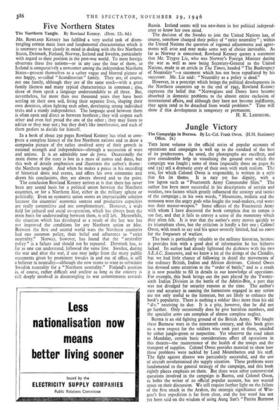Five Northern States
The Northern Tangle. By Rowland Kenney. (Dent. 12s. 6d.)
MR. RowLitstro KENNY has fulfilled a very useful task of disen- tangling certain main lines and fundamental characteristics which it is necessary to bear clearly in mind in dealing with the five Northern States, Denmark, Finland, Norway, Iceland and Sweden, particularly with regard to their position in the post-war world. To most foreign observers these five nations—or in any case the four of them, as Iceland is comparatively a newcomer among the independent Northern States—present themselves as a rather vague and blurred picture of one happy, so-called " Scandinavian " family. They are, of course, not one family, although they are of the same stock—with a great family likeness and many typical characteristics in common ; also, three of them speak a language understandable to all three. But, nevertheless, for more than one thousand years they have been settling on their own soil, living their separate lives, shaping their own destinies, often fighting each other, developing strong individual traits and a sturdy independence. The language used between them is often open and direct as between brethren ; they will respect each other and even feel proud the one of the other ; they may listen to advice or they may not ; but they don't like interference, and each of them prefers to decide for himself.
In a book of about 250 pages Rowland Kenney has tried to com- press a complete history of the five Northern nations and to draw a composite picture of the rather involved story of their growth in national strength and independence—through a succession of wars and unions. It is an admirable tour de force. Occasionally the main theme of the story is lost in a mass of names and dates, but this web of details emphasises and illustrates the author's theme: the Northern tangle. And when he makes a pause in his recording of historical dates and events, and offers his own comments and draws his conclusions, they are always shrewd and to the point.
The conclusion Rowland Kenney arrives at is that there has never been any sound basis for a political union between the Northern countries, or for a Northern bloc, either in the military sphere or politically. Even an economic union seems an impracticable solution because the countries' economic sources and productive capacities are really competitive and not complementary. However, a wide field for cultural and social co-operation, which has always been the main basis for understanding between them, is still left. Meanwhile, the situation which has developed as a result of the last war has not improved the conditions for any Northern union or bloc. Between the first and second world wars the Northern countries had one common policy, their belief and adherence to " strict neutrality." Norway, however, has found that the " neutrality policy" is a failure and should not be repeated. Denmark has, as far as one can understand, followed the same line. Sweden, during the war and after the war, if one may judge from the many public statements given by prominent Swedes in and out of office, is still a believer in neutrality—although she now seems to want to substitute Swedish neutrality for a "Northern neutrality." Finland's position is, of course, rather difficult and unclear as long as the country is still deeply involved in disentangling its war commitments towards
Russia. Iceland seems still too new-born in her political independ- ence to know her own mind.
The decision of the Swedes to join the United Nations has, of course, somehow changed their policy of " strict neutrality " ; within the United Nations the question of regional adjustments and agree- ments will arise and may make some sort of choice inevitable. As far as Norway is concerned, Rowland Kenney quotes a statement that Mr. Trygve Lie, who was Norway's Foreign Minister during the war as well as now being Secretary-General to the United Nations, made in an article in The Times, headed "The Bankruptcy of Neutrality "—a statement which has not been repudiated by his successor. Mr. Lie said: "Neutrality as a policy is dead."
However, in a postcript which brings the political developments in the Northern countries up to the end of 1945, Rowland Kenney expresses the belief that "Norwegians and Danes have become absorbed in domestic problems to the almost entire exclusion of international affairs, and although they have not become indifferent, they again tend to be detached from world problems." Time will show if this development is temporary or permanent.
H. K. LEHMICUHL.


































 Previous page
Previous page